- Home
- Kieran Larwood
The Peculiars Page 5
The Peculiars Read online
Page 5
Thinking like that won’t help. She decided to concentrate on something else entirely. From deep within her hood, she focused on the river traffic. A splendid three-masted clipper was gliding its way down to the Pool of London, making the tiny skiffs and wherries around it look like ants. Something about its majestic lines and jutting prow stirred a feeling in Sheba, but it was so vague and distant she didn’t know what it was, or what it meant. An early memory, perhaps, but fluttering just beyond her reach: another loose thread. It was as if her mind was trying to send her a message about a life she had had before her earliest of memories. Had she ever been on a ship?
Had she ever lived in a white house with a marble floor? Probably not. It was more likely that she was dumped at the doorstep of the workhouse by some poor wretch of a woman, like Till’s ma. A starving pauper struck dumb with horror at the hairy child she had given birth to.
Just the thought of it made Sheba’s head swim with overpowering emotions. Anger at being abandoned, shame at being so unnatural and hideous, sorrow for whoever had been desperate enough to abandon their own child. Old feelings that were best left deep inside her head. She banished them there now, turning her eyes away from the clipper.
Gigantus finished talking to the bargeman, leaving him to scurry away into the mist, and then stomped over. He looked frustrated.
‘Another petty criminal who doesn’t actually know anything,’ he said. ‘If we were looking for stolen silverware we’d have solved this case twenty times over by now.’
Beside Sheba, Monkeyboy peeped out from under his battered top hat. ‘Letting that lumpy brute ask all the questions isn’t getting us anywhere,’ he said.
‘I suppose you have a better idea?’ Gigantus replied through gritted teeth.
‘I have, as it happens. Didn’t Mama Rat used to know some bloke down on the docks? Fat Albert, or something? Why don’t we go and ask him?’
‘You might be on to something there, Monkey,’ said Mama Rat, thoughtfully. ‘It was Large ’Arry I used to be acquainted with. I remember he still owes me a favour or two.’
‘What are we waiting for, then?’ Monkeyboy said.
‘Nice to see you take interest, Monkey.’ Sister Moon patted the top of his hat.
Monkeyboy shrugged it off with a pout. ‘Yes, well. Anything’s better than standing around here any longer, isn’t it?’
Sheba couldn’t help but agree.
Sheba had thought the roads and bridges of the city crowded, but they were nothing compared to the chaos of the wharves.
Piles of lopsided wooden warehouses leant against each other, stretching out into the river on rickety wooden stakes. Boats of every shape and size were crammed so tightly against each other, it seemed as though the smaller ones would burst into clouds of matchsticks at any second. A scribbly mess of ships’ masts and wooden cranes blocked the sky, and rope was everywhere in twists and loops, tying everything together like a giant spider’s web. And in between it all were hordes of bustling, shouting people. They were loading and unloading ships, hauling crates and boxes in and out of warehouses, on and off carts and barrows. It made Sheba dizzy just to watch them.
The Peculiars scuttled along the dockside, dodging swinging bales of cotton and sweaty rivermen, and all the time following Mama Rat and her cloud of pipe smoke. She didn’t stop until she came to a huge wooden warehouse with the words ‘Pickle Herring Wharf’ emblazoned across the front. There she stood for a few minutes, scanning the faces of the scurrying dockmen. Just when Sheba was beginning to think they were looking in the wrong place, Mama Rat clapped her hands together and laughed. She walked briskly over to a stack of crates and coiled rope, where a man was sitting, whittling away at a hunk of wood with a pocket knife.
He looked up, and for a moment his brows raised in surprise. He quickly pulled them back into a frown, but not before getting a good look at the rest of the Peculiars.
‘You ’ave fallen in with a strange lot,’ he said.
‘Nothing wrong with being a bit strange, dearie,’ said Mama Rat. ‘Everyone, meet Large ’Arry. A very old friend of mine.’
‘Friends, is it?’ said ’Arry. ‘I ’aven’t seen hide nor hair of you for years. I’ve got customers in Mozambique what are better friends than you.’
‘Now, now, ’Arry.’ Mama Rat looked hurt. ‘Don’t be like that.’
Sheba stared at the man from beneath her hood. He certainly was large, although not compared to the huge bulk of Gigantus. Most of ’Arry’s size was around his belly, which strained to burst out of his woollen jumper. He had shaggy grey hair and a grizzly beard, turned yellow around his mouth from tobacco smoke. He looked just how she’d imagine an old sea captain to be. He carved off a few more slivers of wood, before Mama Rat’s exaggerated pout made him mellow.
‘All right, then,’ he said. ‘What is it brings you and your misshapen crew down on the docks? After something, I don’t doubt.’
‘Just some information,’ said Mama Rat. ‘About a mudlark girl who’s gone missing from the river.’
‘One of those poor scraps what go rooting about in the filthy mud between the jetties, you mean? I ’aven’t heard nothing about that, but then . . .’ He paused. ‘What’s this information worth, exactly?’
‘It’s worth you keeping your face the right shape,’ said Gigantus, knuckles cracking. He appeared to be tired of waiting.
‘Stop that, Gigantus,’ said Mama Rat. ‘I told you, ’Arry’s an old friend. There’s no need to scare him.’
‘And I been threatened by worse than the likes of you,’ ’Arry added. Even so, his hands seemed to shake a little as he went back to his whittling.
‘Please, Mr Large,’ Sheba said. She didn’t want to draw attention to herself, but she was desperate to find out what he knew. ‘The girl that’s missing is my friend. I have to find out what happened to her. Anything you tell us will help, I’m certain.’
’Arry looked up from his piece of wood, into Sheba’s pleading amber eyes. If he noticed the fur on her face, he didn’t show it. The frown lines on his brow softened.
‘I ’ad a daughter meself, once,’ he said. ‘About your age. She went missing too. Fell off a jetty and drowned.’ He sighed and tucked his knife away. ‘There was something a few days ago. Not about a girl, but still . . . I was unloading down on St Saviour’s dock, when some of the lads started talking rubbish about noises in the fog and children going missing at low tide. Now, I don’t hold with all that talk about monsters in the river and suchlike, but I do believe that there was some of them mudlarks what went out and never came back. As far as I heard, anyway.’
‘What do you think happened to them?’ asked Sheba.
Large ’Arry shrugged. ‘What do you think? Sucked down in the mud, I should expect. Who would be so stupid as to go walking around out there? And if the clay didn’t get them, there’s plenty of other things that might. This city’s full of evil, you know. Murderers, thieves, baby farmers chucking kiddies in the river, doctors chopping up grave-robbed bodies . . . things you wouldn’t believe. London ain’t no kind of a place to be growing up in. Not if you’re skint paupers like you lot.’
The old sailor pulled his knife out again and went back to his whittling, signifying the meeting was over. Mama Rat thanked him, and he grunted in a way that might be perceived as affectionate.
The Peculiars began to make their way back through the maze of docks to London Bridge.
Other children are missing too. The thought rolled around in Sheba’s head like a marble. If that were true, then what had they stumbled into? And where could Till be now?
She was so wrapped up in her thoughts that she didn’t notice the shape of a dark figure in the shadow of a warehouse doorway. The light was dim there, dusky enough to hide the long tendrils of matted hair beneath a large hat, the straggly beard, and the strangely curved sword that hung underneath a long coat. It even hid the thick lines of black paint that spread from one side of his face to the other, but not the gl
eam of his eyes as he watched the Peculiars make their way home.
Chapter Seven
IN WHICH WE DISCOVER GIGANTUS IS A SECRET PIGEON-FANCIER.
At the show that night, Sheba half expected to see Till, back to tell her she had run away from her life as a mudlark for something better and less stinky. But there was no sign. And worrying about her made it hard for Sheba to put on a proper performance.
‘You’d better start making an effort,’ Plumpscuttle had warned her afterwards, ‘or it’s back to that dump at the seaside for you, missy.’
Now she had something else to worry about.
The next morning she lay in bed long after the others had arisen, staring miserably at the patches of damp, cracked plaster on the ceiling.
This isn’t helping, she finally said to herself. I’m going to get up and try twice as hard to find Till today.
In one determined movement, she sat up and threw back her tattered blanket. She was just about to pull on her pinafore and go downstairs, when she noticed a large, rectangular lump in Gigantus’s giant mattress. She recalled the way the big man was always scribbling away in his journal. Was it a secret diary, maybe? Or a manual on how to smash someone into a pulp?
The voice in her head told her to leave it well alone. It was a bad idea to pry into anyone’s secret books, but if you did it to a strongman over two metres tall, you were asking for trouble. The kind of trouble that required stitches afterwards.
But she just couldn’t help herself. The book-shaped bump seemed to cry out to her. Her fingertips itched at the thought of uncovering it. Maybe just a tiny peek, she thought, as she reached under the bedding . . .
It was indeed a book. A large, leather-bound one, much bigger than his journal. She picked it up and opened the heavy cover. On the first page, written in careful copperplate script, was ‘The Thrilling Escapades of Agnes Throbbington by Gertrude Lacygusset’.
Agnes Throbbington? Gertrude Lacygusset? Sheba opened the first page, listening all the while for footsteps on the stairs.
Agnes could feel her tiny heart flutter away like a tiny fluttery thing. Across the crowded ballroom stood Jeremy Gristle, the local pig doctor and the champion of her dreams.
He looked out across the dance floor with his manly steel-grey eyes. His face was elegantly chiselled, with a firm, manly jaw. His raven hair hung about his broad, manly shoulders. He wore a silk topcoat and a waistcoat embroidered with silver flowers. That was quite manly, too.
All around Jeremy farmers’ daughters and rural spinsters were draped in flouncy layers of every colour, but he cared not a fig for them. Ever since their eyes had met over the pigsty three days ago, Agnes knew all he could think about was her. Thank goodness her father’s prize porker had developed chronic diarrhoea or they might never have met.
When Jeremy caught her eye, Agnes’s breath stuck in her throat. Even from across the ballroom, it felt as though she was falling deep into his gaze, as if their very souls were bleeding into one great big squishy blob of true love. She twitched her nose in as pig-like a manner as possible, and gave a little oink of delight . . .
Sheba heard a creak from the stair floorboards. Her heart pounding in her chest, she shoved the book back under the mattress and tried to look as though she was just getting up from her bed. After a few seconds, when Gigantus failed to burst into the room, she got up and peeked down the stairs. They were completely empty.
Serves you right for being so nosey, she thought. But she couldn’t help feeling slightly disturbed as she padded down the narrow stairs to find the others.
They were in the yard, debating what course of action to take next.
‘Maybe we go back to docks,’ Sister Moon was saying. ‘Ask more questions.’
‘What’s the point in that?’ Gigantus paused in his exercises. Today he was lifting the wooden caravan up and down off the ground. ‘Nobody really knows anything. We’ll just hear more claptrap about monsters eating children in the fog. Morning, Sheba.’
Sheba looked at Gigantus with new eyes. Was he really Gertrude Lacygusset, romantic novelist? She tried to cover up her confusion by joining in the debate. ‘But if others have been taken,’ she said, ‘then couldn’t it all be connected?’
‘Why would anyone want to kidnap a bunch of starving river rats?’ Monkeyboy was perched on the privy roof, nibbling his toenails. ‘If you’re going to nab children, you’d be best off taking ones that aren’t going to pop their clogs in a month or two.’
‘On the contrary,’ said Mama Rat. ‘If you were taking children, then the lowest of the low is where you’d start. After all, apart from us, who’s even noticed they’re gone?’
‘Maybe one of them doctors has taken them to peel open and look inside. Or something worse. I heard a story once about a butcher who chopped up people and made them into pies. Maybe he’s decided to make Mudlark Muffins instead.’
‘That’s my friend you’re talking about, Monkeyboy!’ Sheba snapped, and was surprised to see him look ashamed.
The argument was interrupted by a fluttering and flapping of wings as something that almost resembled a bird dropped out of the sky and onto the fence. It sat there, blinking and attempting to coo.
‘What is that?’ said Monkeyboy, his eyes nearly popping out of his head.
‘I think it a pigeon,’ Sister Moon said.
It did have a beak, and some tatty things that might be feathers, but it didn’t look much like a bird to Sheba. Not unless it was some new, London variety that had been crossed with a rat and nested at the bottom of a coal scuttle.
‘Urgh, I flipping hate pigeons,’ Monkeyboy clapped his hands and tried to scare it away. ‘Rats with wings, that’s what they are!’
‘Just be careful what you’re saying about rats,’ said Mama Rat.
‘You leave that bird alone!’ Gigantus stomped over from the caravan and plucked the pigeon from the fence with one hand. Sheba thought he might crush the little thing like an eggshell, but instead he held it tenderly between his huge fingers as he carefully removed a piece of paper from its leg.
‘I wouldn’t touch that if I were you,’ said Monkeyboy, looking disgusted. ‘You’ll catch something horrid.’
‘What are you doing?’ Sheba asked.
‘It’s a letter from an old acquaintance of mine,’ Gigantus replied. ‘Sent by homing pigeon. I gave him this bird years ago. Never thought he’d actually use it.’
‘Sneepsnood?’ Mama Rat asked, and Gigantus nodded.
‘He wants to see us today. Says it’s urgent.’
Sheba noticed a wary glance pass between the two. Sister Moon also seemed to tense beside her.
‘Who’s Sneepsnood?’ Sheba whispered.
‘Man that Gigantus know. I only see him one time, but not trust him. Criminal, I think.’
‘Well, we’d best oblige him then,’ said Mama Rat.
Sneepsnood’s Reconstituted Metal Goods Emporium was a tiny shop on Whitechapel High Street. The mullioned windows that faced the road were covered in grime. If you peered really closely, you could just about make out display shelves crammed with metal goods of all descriptions. There were old music boxes, keys of every size and shape, tin cans stuffed with rusty nails, kettles, buckets, scissors, shears, knives, forks and bits of machinery that had fallen off various steamers and ended up in the river. None of it looked particularly appealing, but then it wasn’t supposed to.
There was a tiny, muck-spattered sign hanging over the door, and when the Peculiars entered, a bell gave a dismal tinkle. The inside of the shop was just as cluttered as the window display. A range of dressers and tables, most with missing legs propped up by books and old bricks, filled all but the tiniest bit of floor space. Every shelf and surface was covered with more useless metal items, some of which had entirely dissolved into little piles of rust. There was a thick coating of dust over everything, broken only by the tiny trails of hundreds of mouse footprints.
At the sound of the bell, a man shuffled out fr
om the back of the shop. He was extraordinarily lanky and wore a tight, threadbare suit. He looked like a cloth-wrapped beanpole. His thinning grey hair was plastered back from his scalp with lashings of pomade, and a pair of wire spectacles perched on the end of his hooked nose.
‘Ah, you got my message then,’ he said.
‘Good to see you again, Jeremiah,’ said Gigantus. He carefully handed over the pigeon, which he had carried in a gentle cradle of his huge fingers all the way from Brick Lane. Sneepsnood grabbed it as if it were an old feather duster and rammed it, squawking, into a nearby cage. Gigantus’s craggy face scowled. I really am learning lots about him today, thought Sheba, as she looked on from beneath her hood.
‘Come round the back,’ said Sneepsnood, oblivious to how close he had just come to a pummelling. ‘I think there’s room.’
The Peculiars followed him through a door at the rear, and there was a series of clatters as Gigantus dragged half the shop along with him. After much squeezing and manoeuvring, they stepped through into the back room.
It was almost as cluttered as the shop, but instead of metal junk, it was full of silverware. Spoons, ladles, bowls, plates, goblets and tureens; stacks of them on tables and benches all around the room. A big hearth filled one wall, and a fire was roaring inside. A blackened crucible sat in the middle, tended by a scruffy little boy. Every now and then he fed another piece of silver into the pot and watched it slowly dissolve into the thick, glinting soup of molten metal. On the workbench next to him were piled twenty or more bars of solid silver. Sheba realised what Sister Moon meant about the man being a criminal.
‘Now,’ said Sneepsnood, turning to face them with a knowing smirk. ‘Word comes to me you’ve been looking for someone down on the waterfront.’
Mama Rat raised an eyebrow. ‘Word travels fast, Jeremiah. How did you get to hear of that?’
‘There aren’t many . . . ahem . . . groups like yours in the city.’ Sneepsnood smiled, showing grey gums and yellow teeth. ‘And you seem to have asked an awful lot of people. Caused quite a stir in the underworld, believe me. Folk thought the peelers had started some new kind of task-force or something.’

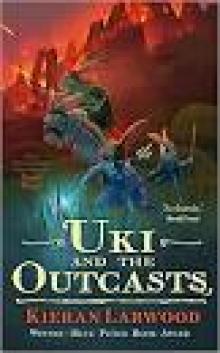 Uki and the Outcasts
Uki and the Outcasts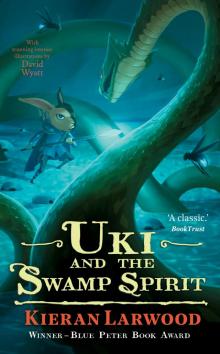 Uki and the Swamp Spirit
Uki and the Swamp Spirit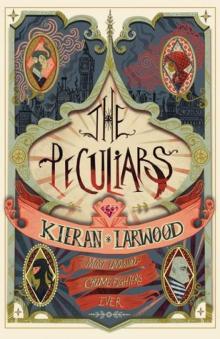 The Peculiars
The Peculiars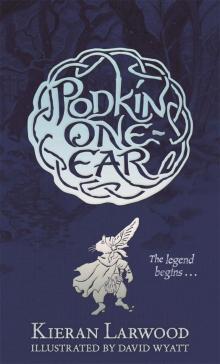 Podkin One-Ear
Podkin One-Ear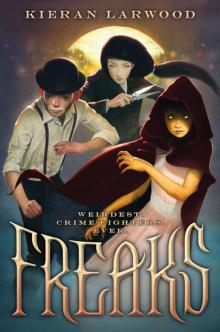 Freaks
Freaks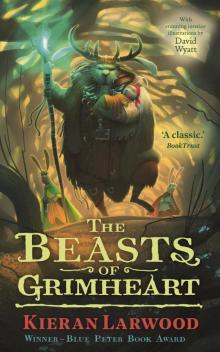 The Beasts of Grimheart
The Beasts of Grimheart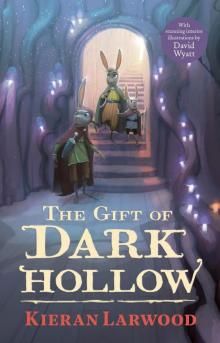 The Gift of Dark Hollow
The Gift of Dark Hollow